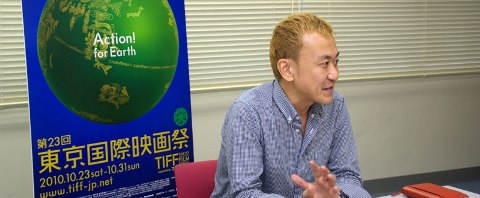2010.10.22
[Special Contents]
HogaHolic ├Ś JAPANESE EYES, Interview with Yoshi Yatabe, Programming Director of TIFF

The ŌĆ£faceŌĆØ of a film festival is no doubt the line-up of the films itself, while at the same time, it is no exaggeration to say that the core of a film festival, which glimmers behind the ŌĆ£faceŌĆØ, is the existence of the directors who select the films. In the interview with Mr. Yoshi Yatabe, the programming director for the Competition section since 2007, discussions were held about how a film festival should function.

©2010 HogaHolic
Yoshi Yatabe
He spent his childhood in Europe, then moved to Japan where he lived from junior high school through to university. After graduation, he joined a major bank, by which he was sent to France and England as an expatriate. He watched more than 300 films a year during that time, and upon his return to Japan, he decided to change his career to bring overseas films to Japan. He has been involved with film distribution and promotion since then, while producing a documentary of the late director, Makoto Sato. His involvement with a film festival began with his association with a ŌĆ£Festival du Film Francais au Japon.ŌĆØ He joined the TIFF in 2002 as a member of the festival staff. Since 2004 he has been responsible for the programming division which selects films for screening. He took up the position of programming director for the Competition section in 2007.
What is the specific role the TIFF should play?
---- It seems to me, first of all, that whether the TIFF has any distinctive characteristic has often been questioned. However, this ŌĆśŌĆØcharacteristicŌĆØ of a film festival is a difficult thing. What is your thought on this, please?
Yatabe: Just as you say, developing the characteristics of a film festival is a difficult issue. In fact, developing characteristics in itself is relatively easy. For example, you can focus on independent films, make it a celebration of young artists, and so on. It can be easily done by bringing the specialization to the fore. However, TIFF should not limit itself to that. That is why we are concentrating on how we can make it enjoyable for the visitors while taking advantage of the regional characteristics of being in Tokyo and in Asia at the moment, rather than contemplating on other characteristics.
---It is my personal opinion, but there seems to have been changes in the direction, to the better, in the last few years, especially the way you are coming forward as the programming director. The person who makes the film selection also assumes direct responsibility in delivering the films to the audience, I think this approach is very important.
Yatabe: Thank you very much. Fundamentally I love the limelight (laugh). I am genuinely pleased to hear that. I agree, it is best for the person who makes the selection to deliver them to the audience. Therefore, Q&A sessions should be hosted by the selection staff, and I host it for the Competition section myself. This means I take responsibility for the films. In other words, I want to choose films which I am prepared to stand by and I want to present to the audience.
---This sincere approach of the festival may be producing an effect. Screenings at TIFF have paved the way for more films to be shown in theatres. A Bulgarian film, ŌĆ£Eastern Play,ŌĆØ which won the Tokyo Sakura Grand Prix last year, will be shown in theatres. You would not usually see Bulgarian films, so this would not have happened without its screening at TIFF.
Yatabe: I am really encouraged with this development. In addition to the theatrical opening of ŌĆ£Eastern Play,ŌĆØ a film from the WORLD CINEMA section last year, ŌĆ£In the City of Sylvia,ŌĆØ was released in theatres in August this year for a smash hit. I agonized over this one, whether to screen it or not, because I felt I may be relying too much on my preferences. So it was a surprise to see such a good reception, and also encouraging to know there are people who are waiting for films like this. ŌĆ£Four Nights with AnnaŌĆØ was also released to theatres and became a hit after screening in the Competition section at TIFF in 2008. The director, Jerzy Skolimowski came back to TIFF the following year as a member of the jury, and this year, he delivered his new film, ŌĆ£Essential KillingŌĆØ to the WORLD CINEMA section. I value these relationships a great deal. I will continue working hard to increase opportunities like this.
---In these circumstances, what is your view on the role of a film festival?
Yatabe: Continuing on from what we were just saying, I believe the most important mission of a film festival is to show as many films as possible which are worthwhile but not yet released to theatres, to convey different charms of films by screening a wide variety of films, and eventually to broaden the audience base of film fans.
---Before we talk about Japanese Eyes section, let me ask you about the Competition this year. Do you see any particular tendency this year?
Yatabe: Every year, we try to ensure we have a variety of films. Up-and-coming young directors, world premieres, etc., we are quite greedy (laugh). If I were to mention one tendency this year, we have more films starred by established actors and films with larger scale than usual, such as ŌĆ£Brighton RockŌĆØ starring Sam Riley of ŌĆ£Control,ŌĆØ and ŌĆ£Never Let Me GoŌĆØ starring Carey Mulligan of ŌĆ£An Education.ŌĆØ I hope the program will tempt those who are not usually interested in the Competition otherwise.
---How about the two Japanese films selected for the Competition?
Yatabe: ŌĆ£Sketches of Kaitan CityŌĆØ by Kazuyoshi Kumakiri and ŌĆ£Post CardŌĆØ by Kaneto Shindo. To be honest, Kumakiri is my favorite director and I always have had high hopes for him. Without being patronizing, I felt Kumakiri has grown from a youth into a man in this film. I wanted it in the Competition the moment I saw it. With regards to Shindo, I did not choose it because he is a 98-year-old director. Please donŌĆÖt get me wrong, but I chose his film because the film is excellent. That is why it is in the Competition.
Young directors in Japan and the TIFF
------Let me ask you about the Japanese Eyes. The concept of the section changed significantly last year.
Yatabe: We have been exploring the best form for this section from the beginning so that there will be a clear distinction between Special Screenings section and Japanese Eyes section. That is why we dared to concentrate on distinguished independent Japanese films. I was nervous in my heart how this change would be received. To our great pleasure, the response turned out to be more than what we had expected, and we decided to maintain the same stance this year.
------How was the selection made?
Yatabe: Five members, including myself, viewed the films for selection. The list included about 200 films so the selection took a very long time. I was very pleased to see many young artists applied who did not really consider applying for the TIFF before. We could feel the base of the artists was expanding. It is our honor that these young talents are aware of TIFF, and we were very pleased. Having said that, the selection was made strictly from the viewpoint of being worthy for being shown at an international film festival, in the same way for other sections.
----Meaning the selection criteria remained high. What was most important in the selection?
Yatabe: What I value is whether I would like to show the film to people abroad. No matter how small-scale the story may be, it should not end as story in a closed group, but it should firmly connect with the world.
---Director Nobuhiro Suwa said in a symposium that even the most insignificant story connects with the world if you get to the bottom of it. Is that what you mean?
Yatabe: Yes. The subject can be small, but it should not restrict your thinking. I would like to see films that will broaden the perspective.
---Would you say something to young filmmakers who may be aiming at the TIFF in the future?
Yatabe: It may sound clich├®d, but I would like independent films to think outside the box. I hope to see films that are so powerful that they would surpass existing films. I welcome films with great characteristics.
---Finally, how would you like the Japanese Eyes section to evolve? I would think it would provide the best opportunity for independent films?
Yatabe: It would be my pleasure if filmmakers view it that way and make the most of the opportunity. The films will have English subtitles, so there is a chance it may attract attention of buyers and related parties from overseas. It would be brilliant if it becomes the staging point for the new Japanese talent to spread their wings around the world.
(Interviewed and written by Kenji Minakami)
HogaHolic ├Ś JAPANESE EYES(Japanese site)





